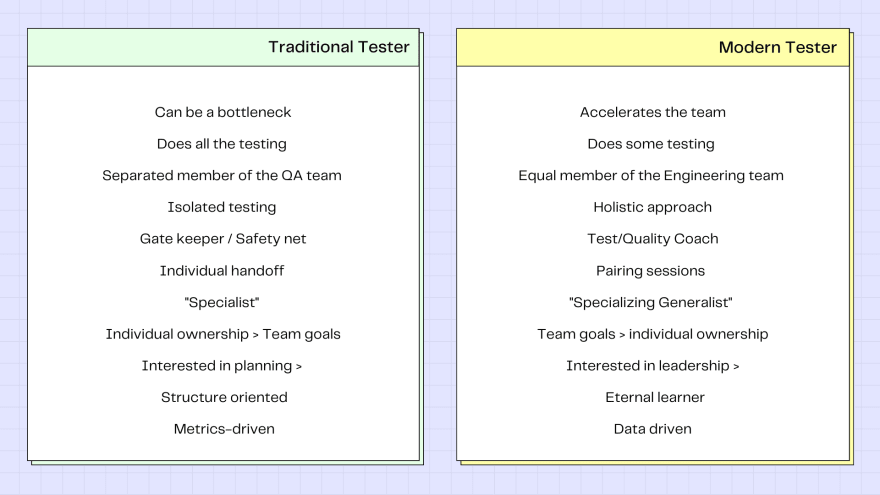An Interest In:
Web News this Week
- April 19, 2024
- April 18, 2024
- April 17, 2024
- April 16, 2024
- April 15, 2024
- April 14, 2024
- April 13, 2024
Hello, Modern Testing World
Three months ago, I was flying over India, on my way to Bangkok, when I first dabbled into Quality Engineering and Testing.
On that crowded plane, half asleep, half thirsty, and half gazing over the season 19 of Keeping Up With the Kardashians that the couple next to me was watching, I started reading the offline articles on Quality Engineering that I had conscientiously prepared the days before the flight.
Maybe it was something about that situation the intense air conditioner, my swollen feet, or insomnia coming to a peak but what I was reading started making perfect sense, got me hooked, and from that unpleasant flight until now, Ive been learning about this exciting, full of potential, and often underestimated field within the industry.
Today I want to gather my thoughts and summarize my learnings regarding the role of the Modern Tester, and I hope that this article will communicate that, as testers, the ways in which we contribute to the success of our software delivery teams are and should be constantly evolving.
Let us first start with a clarificationor rather, a declaration:
Modern Testing is the antithesis of Traditional Testing
More than that, it is the antidote to it.
But why is this change necessary? Simply put, because the world has changed, so have our tools (AI, Big Data, OpenSource, etc) and processes (Agile widely replaced e.g. Waterfall), and our roles should adapt as well.
For this matter, the Modern Tester does some testing, but their main activity is not hunting for bugs anymore.
The Modern Tester is not a bug hunter
Woah, woah woah.
Instead, they become a Test/Quality Coach who leads and nurtures a Quality Culture for the whole team.
You may wonder what is a Quality Culture? So let us first define what is Quality at all.
What is Quality and why is it important?
But, before we continue, it is appropriate that we define what Quality is.
Quality is not only about zero-bug-backlog or code correctness, but instead, Quality is a mentality shared by the whole team to deliver sustainable and scalable software that solves the problems that the customer wants to have solved.
Quality is the users reaction to what we build.
Quality Culture is a shared mindset toward continuous improvement
So now that we have defined Quality, it is easier to understand the concept of Quality Culture as a mindset shared within the team, that requires learning, tools, and especially leadership, communication, and a profound desire for improvement. This is where the mentioned Quality Coach, i.e. Modern Tester, steps in and leads the way remember when I mentioned the huge development potential within this field?
That is all great, but how can we create this Quality Culture?
Basically, by helping the team learn from mistakes and adapt. It sounds logical because it is.
And the best part, of course, is the results:
The Modern Tester's main goal is to accelerate the team
I still remember a couple of years ago, in August, when the by-that-time colleague went on vacation and the whole system almost collapsed because this person was the only one who knew some specific application commands. This person was a bottleneck, i.e. a member of the team who is specialized in something that is otherwise not well known by the rest of the team. If this one fails, everybody fails. That was not good and it could have been avoided!
By sharing testing practices and knowledge within the team, and becoming more generalists about their abilities, an organization spares itself not only bottlenecks but also that summertime sadness. And this, overall, speeds up the team on the shipping of quality, cuts out delays, and eliminates inefficiency.
Software Engineer (specializing) in Test
To holistically approach the product and easily spot places for improvement, the Modern Tester is in close contact with the Product team; nevertheless, they are an equal member of the Engineering team, have a general understanding of engineering, and specialize in testing and parallelly, other software engineers of the team specialize in Frontend, Backend, Systems, DevOps, etc, respectively. They are all specializing generalists!
So far we have talked about a couple of things regarding the role of the Modern Tester, and as a visual learner myself, I have created some visual aid that summarizes and enhances the previous information:
These are my biased thoughts strongly inspired by Lisa Crispin, Janet Gregory, and Alan Page and Brent Jensens AB Testing Podcast. Last but not least, especially thanks to Priscilla and Simon, who introduced me to this marvelous world of Modern Testing.
Now it is your turn to share your thoughts on this Modern Tester approach. Are you curious about it? Do you already implement it within your organization? Or do you prefer to stick to the traditional testing approach?
Original Link: https://dev.to/laurapacis/hello-modern-testing-world-336n
Dev To
 An online community for sharing and discovering great ideas, having debates, and making friends
An online community for sharing and discovering great ideas, having debates, and making friendsMore About this Source Visit Dev To


